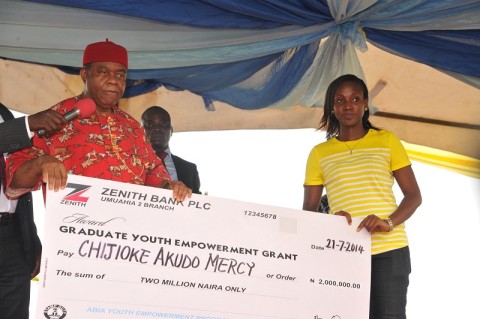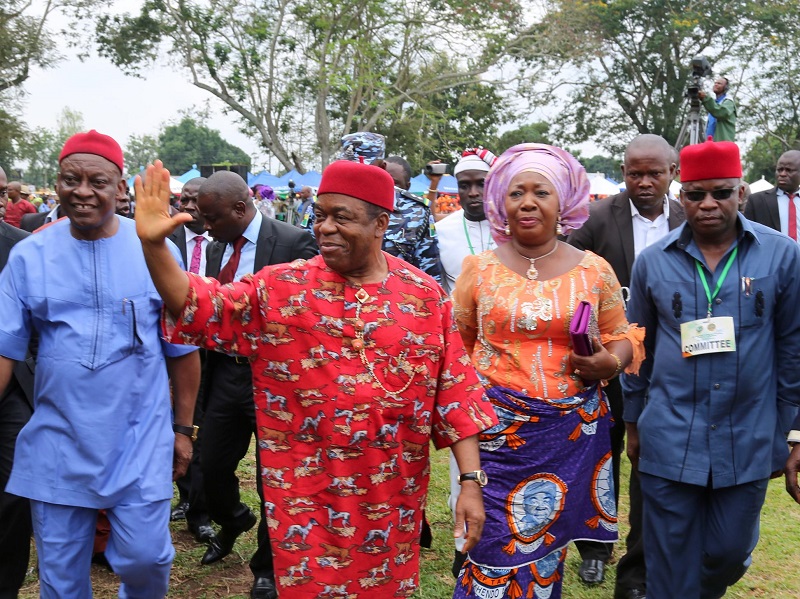Right from the earliest history of man, leadership has been a characteristic feature of human enterprise. Where any society is, by way of its socio-econo-political development, depicts a clear measurement of the potency of its leadership. It, therefore, follows that the gap between two human societies is a reflexion of the differences between the two different leaderships.

cheques to some of the beneficiaries as part of their empowerment
during the 2014 youth empowerment programme for Arochukwu, Ohafia and
Bende at Bende Local Government headquaters in Bende LGA
In human development, there has always been a distinction between a leader and a ruler. While the former is altruistic, visionary, broad-minded and is concerned with the fate of generations yet unborn, the latter is egocentric, parochial, materialistic, acquisitive and short-sighted. In two societies where one has a leader and the other a ruler, there is always a wide world of difference.
Majority of third – world countries, despite the abundance of natural resources God endowed them with, have remained undeveloped or, at best, under developed principally due to the quality of their leadership. How would one ever expect a society which leadership is inclined to pleasures and euphoria of the moment to grow?
As would be recalled, history is replete with the rise and fall of many Empires and Kingdoms. In Sub-saharan Africa, such Empires as Songhai, Mali and Kanem-Borno had fallen because of lack of vision and altruism on the part of their leaders. Historiography equally reminds man that renowned Roman Empire and most recently the Union of Soviet Socialist Republics, U.S.S.R, got disintegrated as a result of inarticulate leadership. All in all, any headship of any society or organization that is not anchored on equity, simply but terribly reflects rulership as against leadership.
The strategic importance of effective application and administration of equity in any human milieu does not need to be over-emphasized. Suffice it, however, to say that where there is equity, there is a sense of belonging that generates patriotism, dedication, development, progress, harmony, security and stability.
On the contrary, mere absence of equity, in whatever form and at whatever level of human congregation, becomes a catalyst for frustration, unpatriotism, self destruction, retrogression and eventual societal dislocation and collapse. This is because, under such a very disharmonious circumstance, no sane man would expect any positive contribution from a segment or strata of a society that feels discriminated against, marginalized and psychologically traumatized.
It is in the spirit of equity that the authors of Nigeria’s Federal Constitution of 1999, as amended, even though tele-guided by the Nigerian Military, clearly divided each of the thirty-six states of the Federation into three senatorial zones. It is also in the same spirit that the same constitution provides a maximum period of two tenures of four years each for a governor of a state. In this respect, common sense dictates that the position of a state Governor should rotate amongst the people of the constitutionally stipulated three senatorial zones of each state.
In Abia State, for example, the three senatorial zones are;
(1) Abia – North, made up of Arochukwu, Bende, Isuikwuato, Ohafia and Umunneochi Local Government Council Areas
(2) Abia – Central, consisting of Ikwuano, Isiala Ngwa North, Isiala Ngwa – South, Osisioma Ngwa, Umuahia – North and Umuahia – South.
(3) Abia – South, comprising Aba – North, Aba – South, Obingwa, Ugwunagbo, Ukwa – East and Ukwa – West Council Areas.
Going down memory lane, Abia – North had occupied the governorship seat for two tenures of four years each; 1999 – 2007. Currently, Abia Central has been on the seat since May 29th 2007 till date and the occupant; Chief Theodore Ahamefule Orji, would be safely and successfully rounding off his second tenure on 29th May, 2015.
From the above narrative, it is very lucid that the only senatorial zone that is yet to have a stint at the State’s governorship seat is Abia – South.
At this juncture, it would be necessary to state that in rotating the governorship seat of any Nigerian State, the consideration, principally, should not be based on geo-cultural affinity as the Nigerian Constitution does not provide for it. Rather, the emphasis should be on senatorial delineation.
It would also be necessary to elucidate the very simple fact that in Abia State, constitutionally – speaking, power rotation can not be hinged on primordial sentiments of Old Bende and Ukwa/Ngwa groupings. If this were to be so, it would automatically have followed that an indigene of Ukwa/Ngwa should have become the governor of the state immediately after the tenure of an indigene of Old Bende who governed the state from 1999 to 2007.
There is no gain saying the fact that in a democracy, every citizen has the right to legitimately aspire to any height of leadership. At the same time, the same democracy makes it imperative that the constitutionality of the polity must be strictly adhered to.
As it has earlier been made manifest, the difference between a leader and a ruler has always been very clear. A leader is a man or a woman of immeasurable vision, who is capable of visualizing the future. Such a man imagines socio-econo-political problems and selflessly solves them well ahead of time.
It is, therefore, no wonder why the Governor of Abia State; Chief T.A. Orji, has been consistent in his advocacy that his successor shall be a product of equity in rotation. On many different occasions and fora, he has reminded his audience that he is a product of equity in rotation and that whoever will be his successor shall equally be a legitimate product of rotation in observance of the State’s Senatorial realities.
Governor T.A. Orji is not a lonely voice crying in the wilderness. Many of his colleagues are in the same boat of equity, justice and fairness with him. Governor Sullivan Chime of Enugu State has never hidden his strong belief that the next governor of the state should come from Enugu–North Senatorial Zone of the state. Governor Martin Nwancho Elechi of Ebonyi State has equally advocated a power shift to Ebonyi–South. Governor Godswill Akpabio of Akwa-Ibom State has repeatedly said that his successor should come from Eket Senatorial District in 2015 while Governor Liyel Imoke of Cross River State has made it clear, through a legislation by the State House of Assembly, that the next governor of the state shall hail from the Northern Senatorial Zone of the state. Lest we have forgotten, the immediate past Governor of Anambra State, Mr. Peter Obi, had successfully insisted on power shift on senatorial basis that gave rise to the emergence of his successor; Mr. Willie Obiano.
Governor T.A. Orji’s advocacy for power shift based on Senatorial understanding simply presents him as a leader who appreciates the fact that the strongest link in a chain is, surely, its weakest link. Being the consummate administrator that he is, the Governor realizes that no society can enjoy full development and growth if within it a section or an area perceives itself as a victim of calculated marginalization and deprivation. This thinking makes the humble but result – oriented Ochendo a statesman of note. Politicians think of self advantages but T.A. Orji is concerned with what will enthrone peace, harmony, security and progress in his state even when he would have left office.
People from all walks of life and shades of opinion in the state have, out of their own volition, acknowledged Ochendo as a man that is worth his salt. It would, therefore, be expected that all and sundry should appreciate the wisdom of Sir T.A. Orji’s advocacy for equity in rotation of the governorship of the state.
There could be very many wealthy gubernatorial aspirants from either the North or Central Senatorial Zones of the State who, if equity and political morality were to be thrown to the wind, would easily grab the seat based on cash and carry syndrome. Interestingly, such wealthy personalities had, for the umpteenth time, publicly expressed their appreciation of and belief in Ochendo’s concern for equity and peaceful co-existence. It would, therefore, not be out of place if such persons toe the line of patriotism and selflessness by giving support to the governor in his bid to enthrone equity. It must be mentioned here that the Northern senatorial zone of Abia State did not succeed itself in 2007. It will also follow that the central senatorial zone will not succeed itself in 2015.
To the good indigenes of Abia South, made up of the three clans of Asa, Ndoki and Ngwa, in their alphabetical order, every care must be taken to make sure they put their acts together. In the pursuit of their aspiration, ego, bitterness and inconsiderate rigidity for which many political actors from the zone are known, should this time, give way to selfless, liberal, patriotic and friendly consideration. That negative and self-destructive tendency of “if not me, let all of us fail” for which they are known and ridiculed should be a very distant thing of the past. Again, some prominent men in the zone who, like Esau in the Bible, are fond of selling their birth right because of greed, should, for goodness sake realize that this is the most crucial moment in the political history of the zone.
Furthermore, it should be noted that he who goes to equity should go with clean hands. Since Abia-South is asking for the governorship of the state in 2015 based on equity and competence, the zone should also make sure that equity reflects holistically in the zone.
In this regard, should an Ngwa indigene of Abia–South, for instance, clinche the governorship of the state, the Senator for the zone should come from Asa. This is because Ngwa should not produce the governor and the Senator at the same time. Taking cognizance of the fact that an Ndoki man; Rt. Hon. Adolphus Wabara, represented Abia-South at the Senate for eight consecutive years, 1999 – 2007, equity would demand that if the senate position of Abia – South should rotate to Ukwa in 2015, the position should go to Asa which is Ukwa–west. The House of Representatives seat should, in that case, be retained by Ukwa – East.
On the other hand, if an indigene of Ukwa becomes the Governor in 2015, the Ngwa group should retain the senatorial position. Under such a circumstance, the House of Representatives’ seat for Ukwa would be occupied by an indigene of the Local Government Area that did not produce the Governor.
In summary, Governor T.A. Orji must be commended for his intrepidity and resoluteness in his pursuit of equity.
Chief (Sir) Don Ubani, ksc, JP
(Okwubunka of Asa)
Umuiku-Isi-Asa, Ukwa – West
P.M.B. 7048 Aba
08035523360
Email: ubanidon@yahoo.com







